Business Ethics: Philosophies, Practices and Perspectives
VerifiedAdded on 2023/05/31
|16
|4470
|206
AI Summary
This article discusses the importance of business ethics in today's corporate world. It explores the different perspectives of business ethics and its impact on society, including corporate responsibility, CSR, good governance, and environmental accountability. The article also highlights the implications of business ethics on brand image, customer perception, and competitive advantage.
Contribute Materials
Your contribution can guide someone’s learning journey. Share your
documents today.
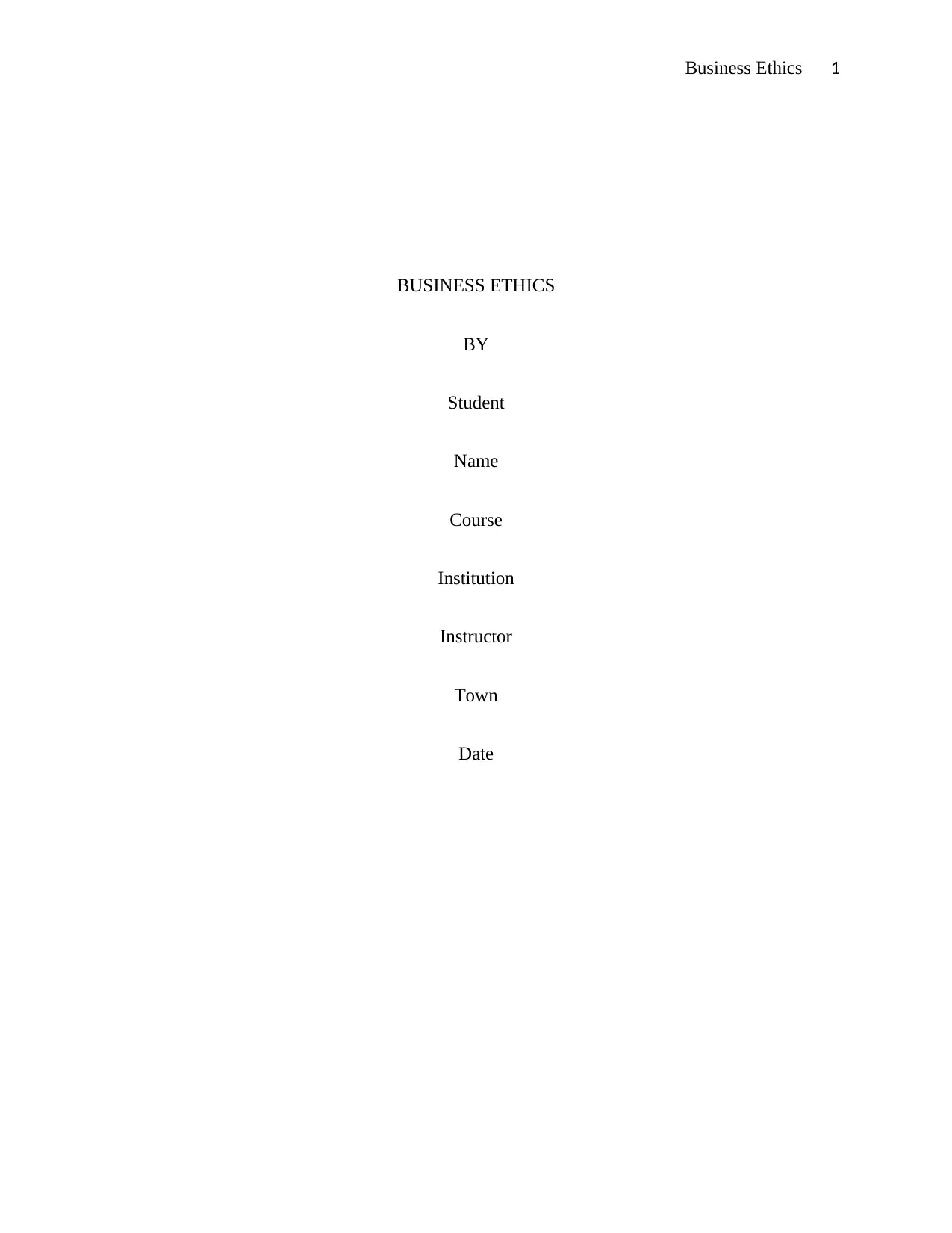
Business Ethics 1
BUSINESS ETHICS
BY
Student
Name
Course
Institution
Instructor
Town
Date
BUSINESS ETHICS
BY
Student
Name
Course
Institution
Instructor
Town
Date
Secure Best Marks with AI Grader
Need help grading? Try our AI Grader for instant feedback on your assignments.
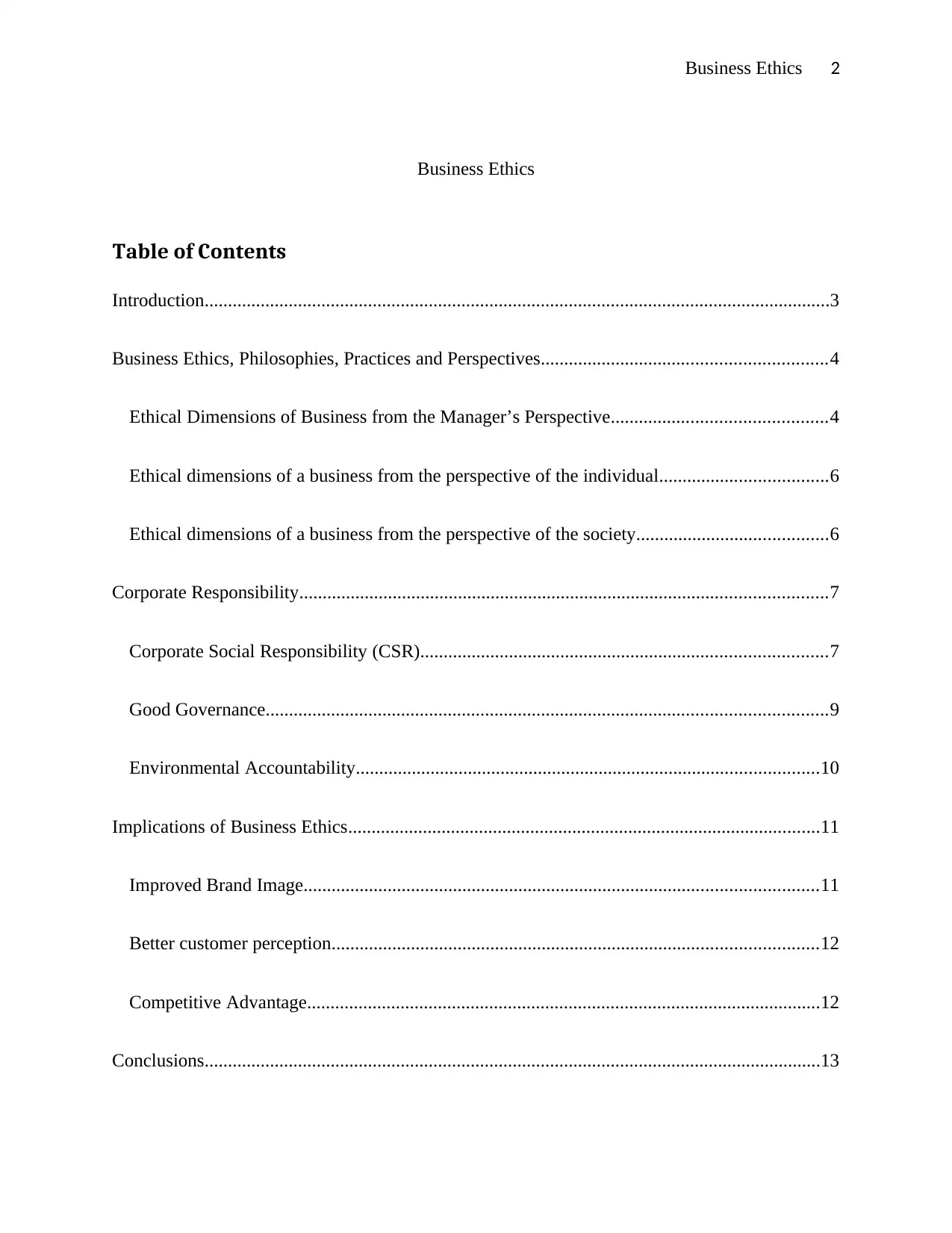
Business Ethics 2
Business Ethics
Table of Contents
Introduction......................................................................................................................................3
Business Ethics, Philosophies, Practices and Perspectives.............................................................4
Ethical Dimensions of Business from the Manager’s Perspective..............................................4
Ethical dimensions of a business from the perspective of the individual....................................6
Ethical dimensions of a business from the perspective of the society.........................................6
Corporate Responsibility.................................................................................................................7
Corporate Social Responsibility (CSR).......................................................................................7
Good Governance........................................................................................................................9
Environmental Accountability...................................................................................................10
Implications of Business Ethics.....................................................................................................11
Improved Brand Image..............................................................................................................11
Better customer perception........................................................................................................12
Competitive Advantage..............................................................................................................12
Conclusions....................................................................................................................................13
Business Ethics
Table of Contents
Introduction......................................................................................................................................3
Business Ethics, Philosophies, Practices and Perspectives.............................................................4
Ethical Dimensions of Business from the Manager’s Perspective..............................................4
Ethical dimensions of a business from the perspective of the individual....................................6
Ethical dimensions of a business from the perspective of the society.........................................6
Corporate Responsibility.................................................................................................................7
Corporate Social Responsibility (CSR).......................................................................................7
Good Governance........................................................................................................................9
Environmental Accountability...................................................................................................10
Implications of Business Ethics.....................................................................................................11
Improved Brand Image..............................................................................................................11
Better customer perception........................................................................................................12
Competitive Advantage..............................................................................................................12
Conclusions....................................................................................................................................13
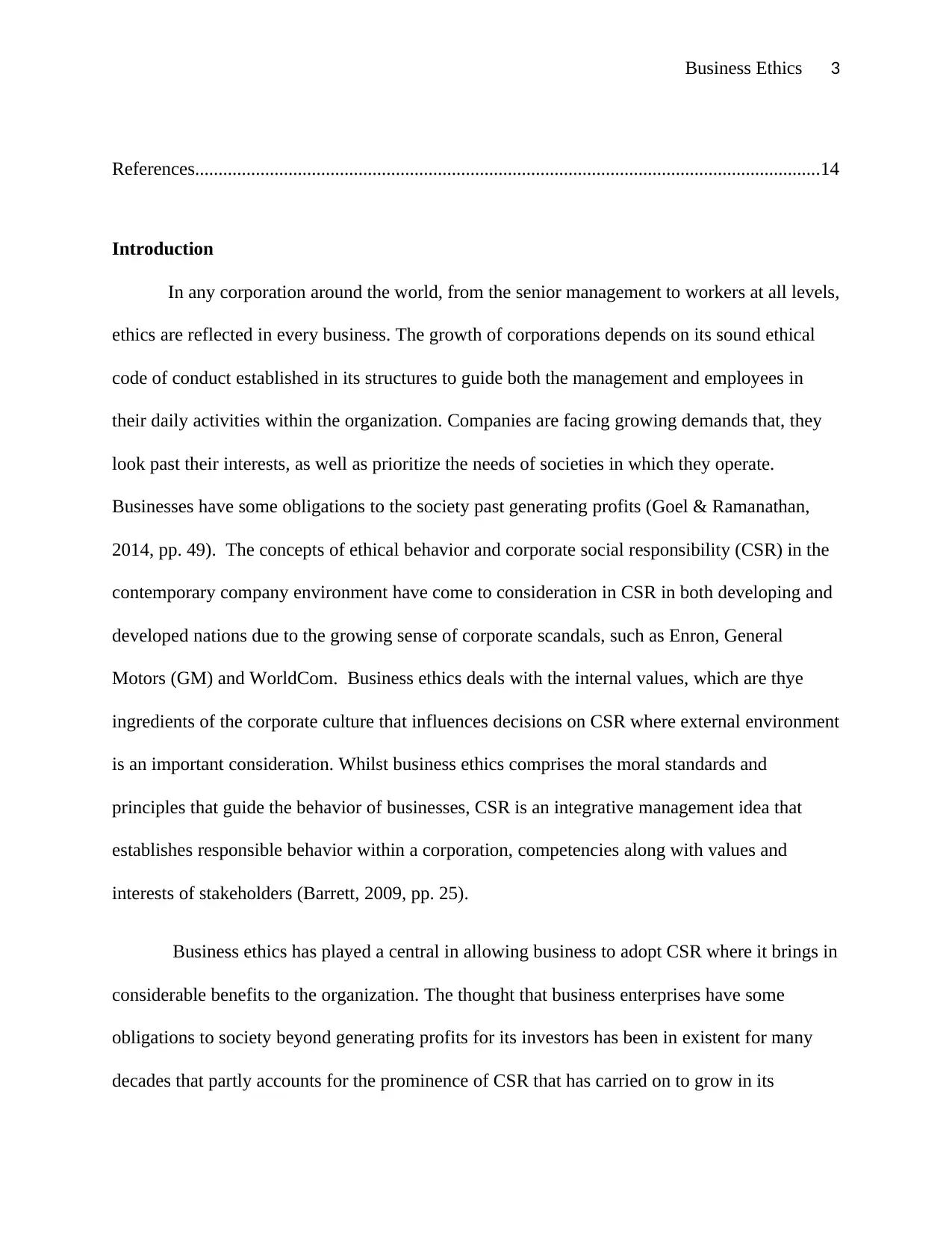
Business Ethics 3
References......................................................................................................................................14
Introduction
In any corporation around the world, from the senior management to workers at all levels,
ethics are reflected in every business. The growth of corporations depends on its sound ethical
code of conduct established in its structures to guide both the management and employees in
their daily activities within the organization. Companies are facing growing demands that, they
look past their interests, as well as prioritize the needs of societies in which they operate.
Businesses have some obligations to the society past generating profits (Goel & Ramanathan,
2014, pp. 49). The concepts of ethical behavior and corporate social responsibility (CSR) in the
contemporary company environment have come to consideration in CSR in both developing and
developed nations due to the growing sense of corporate scandals, such as Enron, General
Motors (GM) and WorldCom. Business ethics deals with the internal values, which are thye
ingredients of the corporate culture that influences decisions on CSR where external environment
is an important consideration. Whilst business ethics comprises the moral standards and
principles that guide the behavior of businesses, CSR is an integrative management idea that
establishes responsible behavior within a corporation, competencies along with values and
interests of stakeholders (Barrett, 2009, pp. 25).
Business ethics has played a central in allowing business to adopt CSR where it brings in
considerable benefits to the organization. The thought that business enterprises have some
obligations to society beyond generating profits for its investors has been in existent for many
decades that partly accounts for the prominence of CSR that has carried on to grow in its
References......................................................................................................................................14
Introduction
In any corporation around the world, from the senior management to workers at all levels,
ethics are reflected in every business. The growth of corporations depends on its sound ethical
code of conduct established in its structures to guide both the management and employees in
their daily activities within the organization. Companies are facing growing demands that, they
look past their interests, as well as prioritize the needs of societies in which they operate.
Businesses have some obligations to the society past generating profits (Goel & Ramanathan,
2014, pp. 49). The concepts of ethical behavior and corporate social responsibility (CSR) in the
contemporary company environment have come to consideration in CSR in both developing and
developed nations due to the growing sense of corporate scandals, such as Enron, General
Motors (GM) and WorldCom. Business ethics deals with the internal values, which are thye
ingredients of the corporate culture that influences decisions on CSR where external environment
is an important consideration. Whilst business ethics comprises the moral standards and
principles that guide the behavior of businesses, CSR is an integrative management idea that
establishes responsible behavior within a corporation, competencies along with values and
interests of stakeholders (Barrett, 2009, pp. 25).
Business ethics has played a central in allowing business to adopt CSR where it brings in
considerable benefits to the organization. The thought that business enterprises have some
obligations to society beyond generating profits for its investors has been in existent for many
decades that partly accounts for the prominence of CSR that has carried on to grow in its
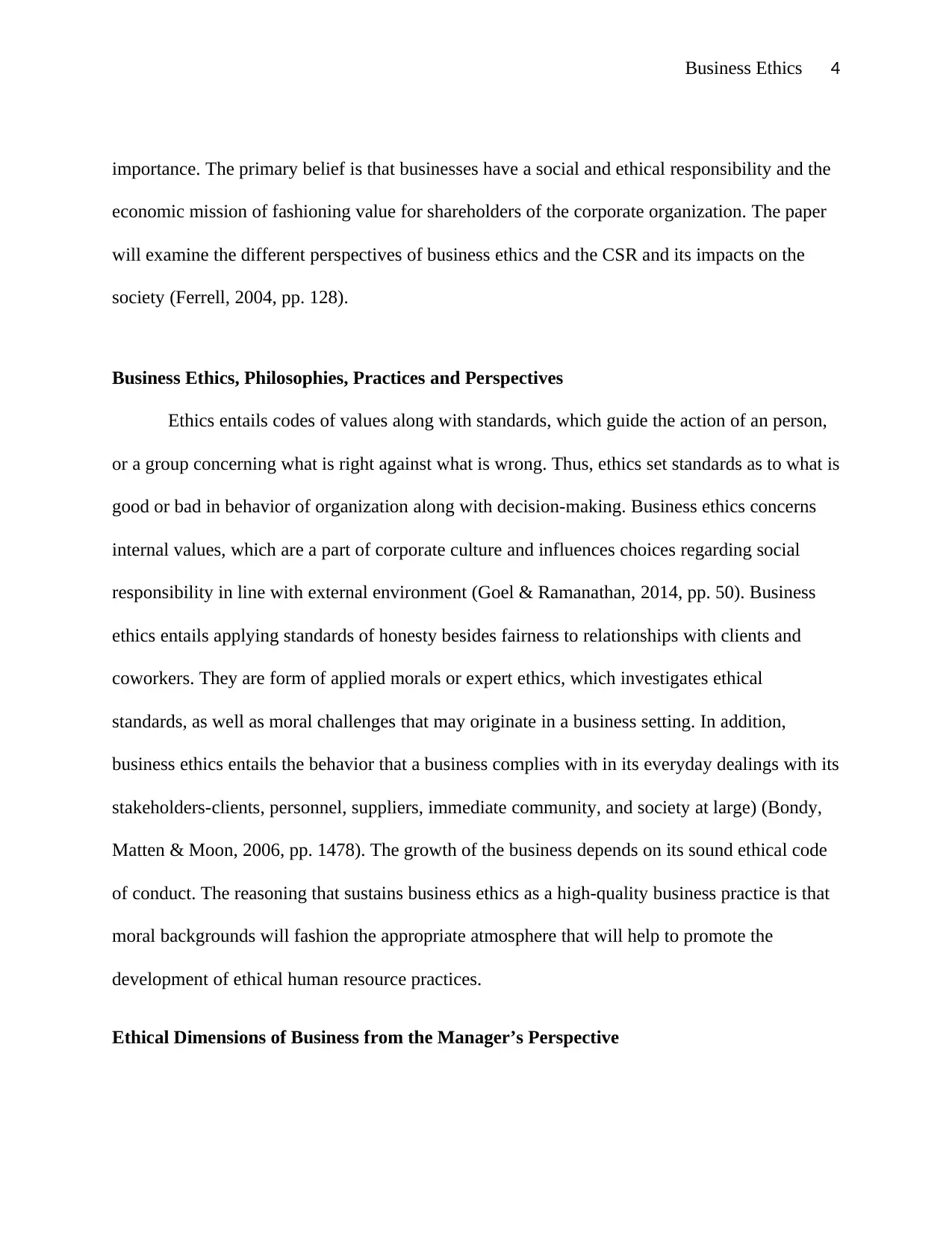
Business Ethics 4
importance. The primary belief is that businesses have a social and ethical responsibility and the
economic mission of fashioning value for shareholders of the corporate organization. The paper
will examine the different perspectives of business ethics and the CSR and its impacts on the
society (Ferrell, 2004, pp. 128).
Business Ethics, Philosophies, Practices and Perspectives
Ethics entails codes of values along with standards, which guide the action of an person,
or a group concerning what is right against what is wrong. Thus, ethics set standards as to what is
good or bad in behavior of organization along with decision-making. Business ethics concerns
internal values, which are a part of corporate culture and influences choices regarding social
responsibility in line with external environment (Goel & Ramanathan, 2014, pp. 50). Business
ethics entails applying standards of honesty besides fairness to relationships with clients and
coworkers. They are form of applied morals or expert ethics, which investigates ethical
standards, as well as moral challenges that may originate in a business setting. In addition,
business ethics entails the behavior that a business complies with in its everyday dealings with its
stakeholders-clients, personnel, suppliers, immediate community, and society at large) (Bondy,
Matten & Moon, 2006, pp. 1478). The growth of the business depends on its sound ethical code
of conduct. The reasoning that sustains business ethics as a high-quality business practice is that
moral backgrounds will fashion the appropriate atmosphere that will help to promote the
development of ethical human resource practices.
Ethical Dimensions of Business from the Manager’s Perspective
importance. The primary belief is that businesses have a social and ethical responsibility and the
economic mission of fashioning value for shareholders of the corporate organization. The paper
will examine the different perspectives of business ethics and the CSR and its impacts on the
society (Ferrell, 2004, pp. 128).
Business Ethics, Philosophies, Practices and Perspectives
Ethics entails codes of values along with standards, which guide the action of an person,
or a group concerning what is right against what is wrong. Thus, ethics set standards as to what is
good or bad in behavior of organization along with decision-making. Business ethics concerns
internal values, which are a part of corporate culture and influences choices regarding social
responsibility in line with external environment (Goel & Ramanathan, 2014, pp. 50). Business
ethics entails applying standards of honesty besides fairness to relationships with clients and
coworkers. They are form of applied morals or expert ethics, which investigates ethical
standards, as well as moral challenges that may originate in a business setting. In addition,
business ethics entails the behavior that a business complies with in its everyday dealings with its
stakeholders-clients, personnel, suppliers, immediate community, and society at large) (Bondy,
Matten & Moon, 2006, pp. 1478). The growth of the business depends on its sound ethical code
of conduct. The reasoning that sustains business ethics as a high-quality business practice is that
moral backgrounds will fashion the appropriate atmosphere that will help to promote the
development of ethical human resource practices.
Ethical Dimensions of Business from the Manager’s Perspective
Secure Best Marks with AI Grader
Need help grading? Try our AI Grader for instant feedback on your assignments.
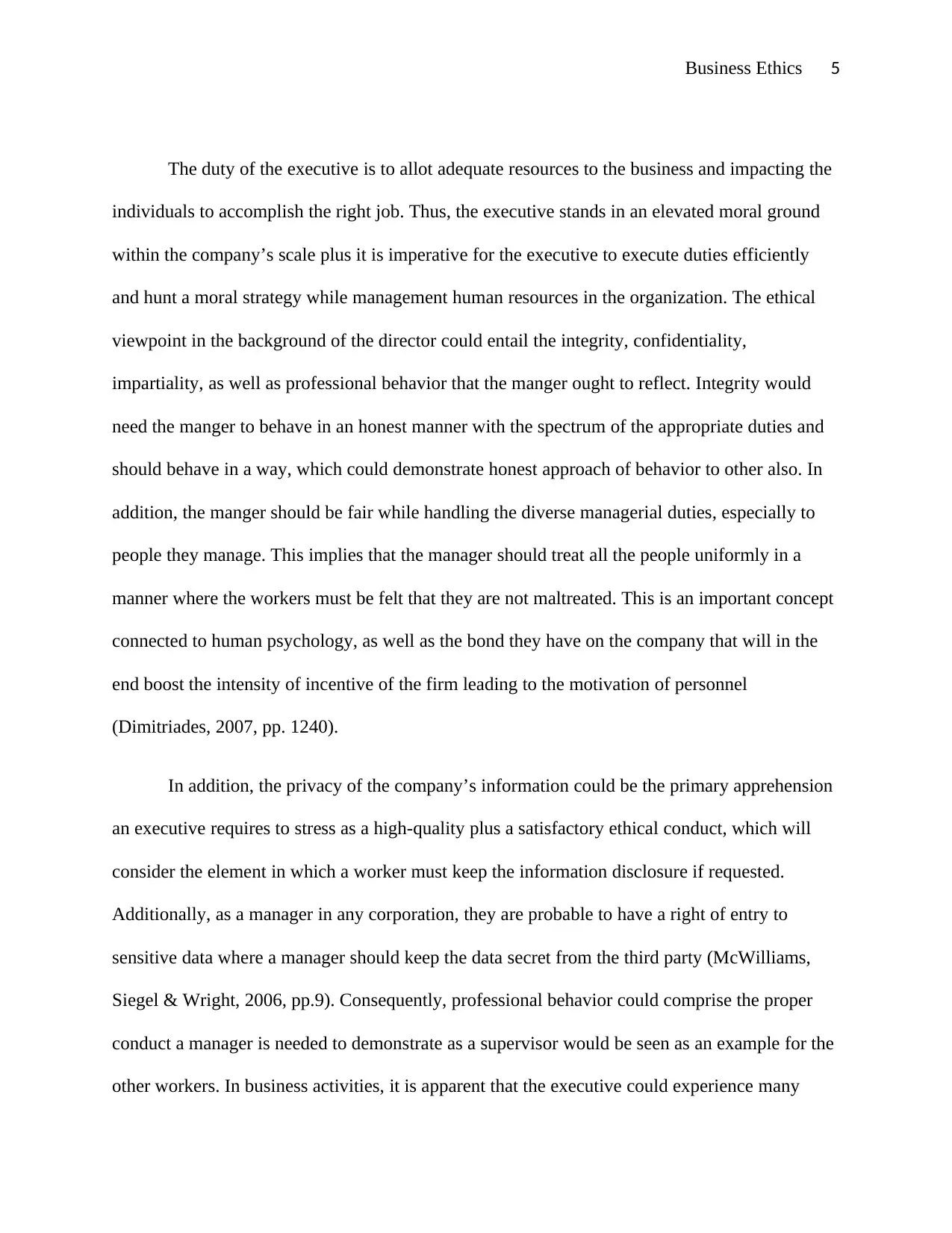
Business Ethics 5
The duty of the executive is to allot adequate resources to the business and impacting the
individuals to accomplish the right job. Thus, the executive stands in an elevated moral ground
within the company’s scale plus it is imperative for the executive to execute duties efficiently
and hunt a moral strategy while management human resources in the organization. The ethical
viewpoint in the background of the director could entail the integrity, confidentiality,
impartiality, as well as professional behavior that the manger ought to reflect. Integrity would
need the manger to behave in an honest manner with the spectrum of the appropriate duties and
should behave in a way, which could demonstrate honest approach of behavior to other also. In
addition, the manger should be fair while handling the diverse managerial duties, especially to
people they manage. This implies that the manager should treat all the people uniformly in a
manner where the workers must be felt that they are not maltreated. This is an important concept
connected to human psychology, as well as the bond they have on the company that will in the
end boost the intensity of incentive of the firm leading to the motivation of personnel
(Dimitriades, 2007, pp. 1240).
In addition, the privacy of the company’s information could be the primary apprehension
an executive requires to stress as a high-quality plus a satisfactory ethical conduct, which will
consider the element in which a worker must keep the information disclosure if requested.
Additionally, as a manager in any corporation, they are probable to have a right of entry to
sensitive data where a manager should keep the data secret from the third party (McWilliams,
Siegel & Wright, 2006, pp.9). Consequently, professional behavior could comprise the proper
conduct a manager is needed to demonstrate as a supervisor would be seen as an example for the
other workers. In business activities, it is apparent that the executive could experience many
The duty of the executive is to allot adequate resources to the business and impacting the
individuals to accomplish the right job. Thus, the executive stands in an elevated moral ground
within the company’s scale plus it is imperative for the executive to execute duties efficiently
and hunt a moral strategy while management human resources in the organization. The ethical
viewpoint in the background of the director could entail the integrity, confidentiality,
impartiality, as well as professional behavior that the manger ought to reflect. Integrity would
need the manger to behave in an honest manner with the spectrum of the appropriate duties and
should behave in a way, which could demonstrate honest approach of behavior to other also. In
addition, the manger should be fair while handling the diverse managerial duties, especially to
people they manage. This implies that the manager should treat all the people uniformly in a
manner where the workers must be felt that they are not maltreated. This is an important concept
connected to human psychology, as well as the bond they have on the company that will in the
end boost the intensity of incentive of the firm leading to the motivation of personnel
(Dimitriades, 2007, pp. 1240).
In addition, the privacy of the company’s information could be the primary apprehension
an executive requires to stress as a high-quality plus a satisfactory ethical conduct, which will
consider the element in which a worker must keep the information disclosure if requested.
Additionally, as a manager in any corporation, they are probable to have a right of entry to
sensitive data where a manager should keep the data secret from the third party (McWilliams,
Siegel & Wright, 2006, pp.9). Consequently, professional behavior could comprise the proper
conduct a manager is needed to demonstrate as a supervisor would be seen as an example for the
other workers. In business activities, it is apparent that the executive could experience many
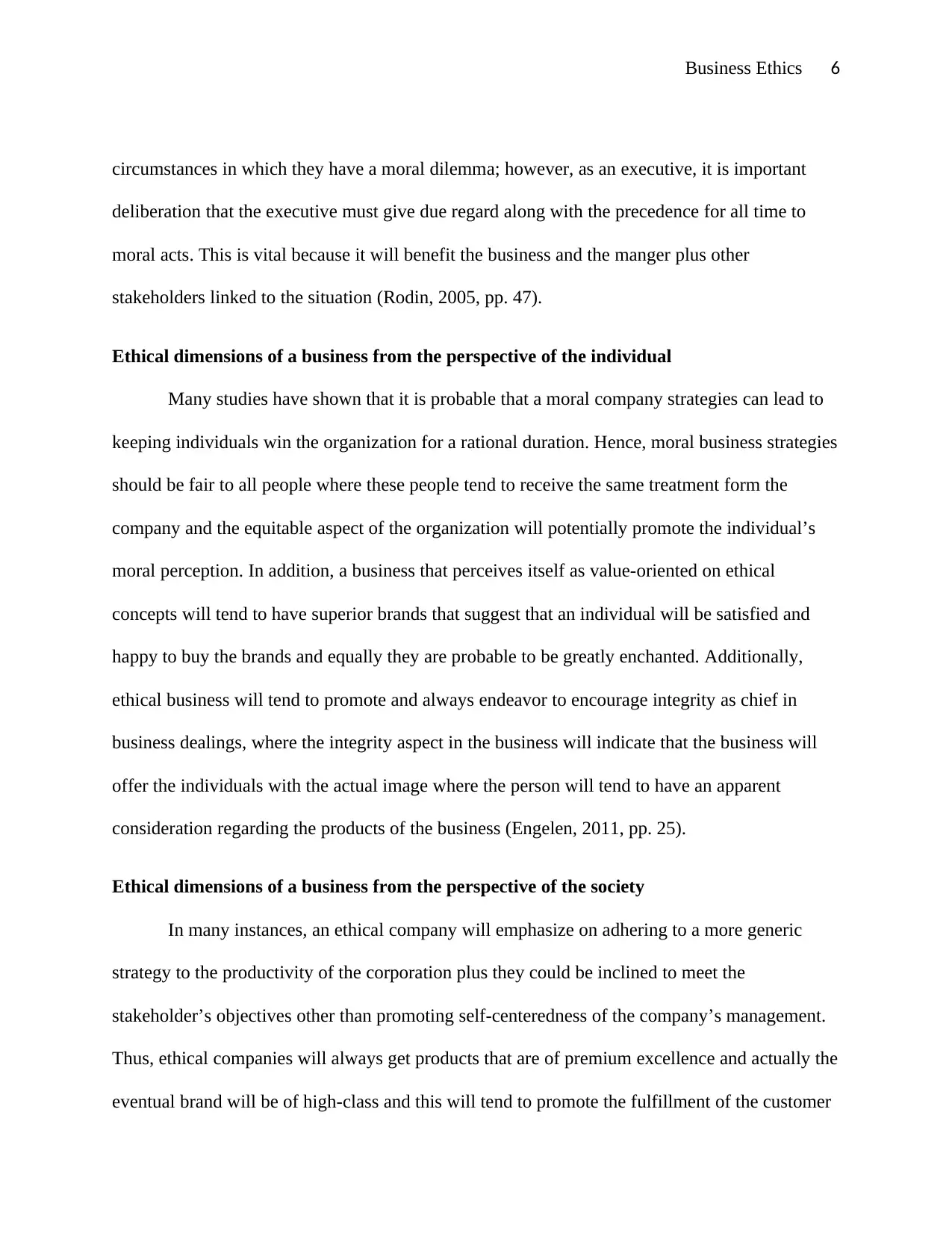
Business Ethics 6
circumstances in which they have a moral dilemma; however, as an executive, it is important
deliberation that the executive must give due regard along with the precedence for all time to
moral acts. This is vital because it will benefit the business and the manger plus other
stakeholders linked to the situation (Rodin, 2005, pp. 47).
Ethical dimensions of a business from the perspective of the individual
Many studies have shown that it is probable that a moral company strategies can lead to
keeping individuals win the organization for a rational duration. Hence, moral business strategies
should be fair to all people where these people tend to receive the same treatment form the
company and the equitable aspect of the organization will potentially promote the individual’s
moral perception. In addition, a business that perceives itself as value-oriented on ethical
concepts will tend to have superior brands that suggest that an individual will be satisfied and
happy to buy the brands and equally they are probable to be greatly enchanted. Additionally,
ethical business will tend to promote and always endeavor to encourage integrity as chief in
business dealings, where the integrity aspect in the business will indicate that the business will
offer the individuals with the actual image where the person will tend to have an apparent
consideration regarding the products of the business (Engelen, 2011, pp. 25).
Ethical dimensions of a business from the perspective of the society
In many instances, an ethical company will emphasize on adhering to a more generic
strategy to the productivity of the corporation plus they could be inclined to meet the
stakeholder’s objectives other than promoting self-centeredness of the company’s management.
Thus, ethical companies will always get products that are of premium excellence and actually the
eventual brand will be of high-class and this will tend to promote the fulfillment of the customer
circumstances in which they have a moral dilemma; however, as an executive, it is important
deliberation that the executive must give due regard along with the precedence for all time to
moral acts. This is vital because it will benefit the business and the manger plus other
stakeholders linked to the situation (Rodin, 2005, pp. 47).
Ethical dimensions of a business from the perspective of the individual
Many studies have shown that it is probable that a moral company strategies can lead to
keeping individuals win the organization for a rational duration. Hence, moral business strategies
should be fair to all people where these people tend to receive the same treatment form the
company and the equitable aspect of the organization will potentially promote the individual’s
moral perception. In addition, a business that perceives itself as value-oriented on ethical
concepts will tend to have superior brands that suggest that an individual will be satisfied and
happy to buy the brands and equally they are probable to be greatly enchanted. Additionally,
ethical business will tend to promote and always endeavor to encourage integrity as chief in
business dealings, where the integrity aspect in the business will indicate that the business will
offer the individuals with the actual image where the person will tend to have an apparent
consideration regarding the products of the business (Engelen, 2011, pp. 25).
Ethical dimensions of a business from the perspective of the society
In many instances, an ethical company will emphasize on adhering to a more generic
strategy to the productivity of the corporation plus they could be inclined to meet the
stakeholder’s objectives other than promoting self-centeredness of the company’s management.
Thus, ethical companies will always get products that are of premium excellence and actually the
eventual brand will be of high-class and this will tend to promote the fulfillment of the customer
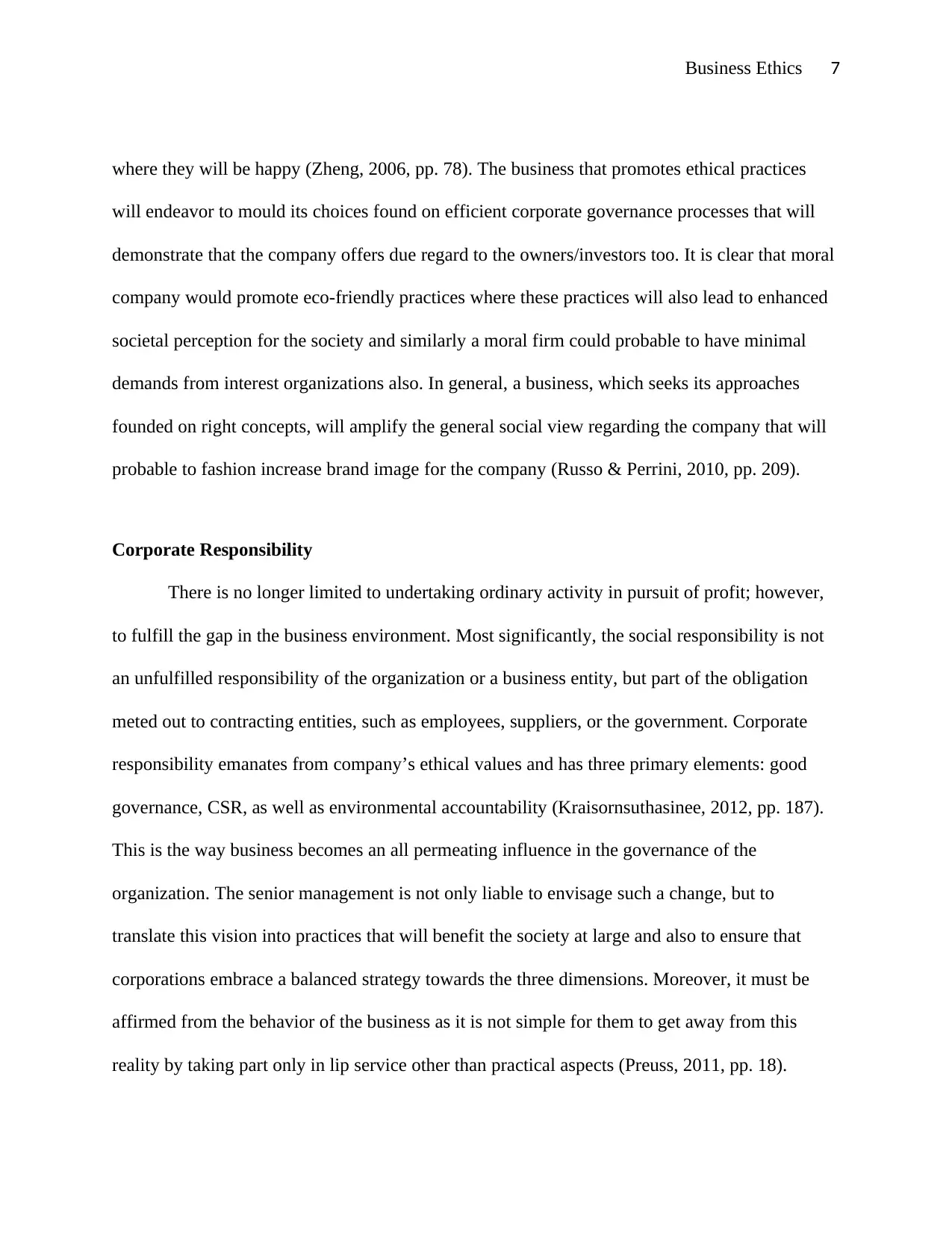
Business Ethics 7
where they will be happy (Zheng, 2006, pp. 78). The business that promotes ethical practices
will endeavor to mould its choices found on efficient corporate governance processes that will
demonstrate that the company offers due regard to the owners/investors too. It is clear that moral
company would promote eco-friendly practices where these practices will also lead to enhanced
societal perception for the society and similarly a moral firm could probable to have minimal
demands from interest organizations also. In general, a business, which seeks its approaches
founded on right concepts, will amplify the general social view regarding the company that will
probable to fashion increase brand image for the company (Russo & Perrini, 2010, pp. 209).
Corporate Responsibility
There is no longer limited to undertaking ordinary activity in pursuit of profit; however,
to fulfill the gap in the business environment. Most significantly, the social responsibility is not
an unfulfilled responsibility of the organization or a business entity, but part of the obligation
meted out to contracting entities, such as employees, suppliers, or the government. Corporate
responsibility emanates from company’s ethical values and has three primary elements: good
governance, CSR, as well as environmental accountability (Kraisornsuthasinee, 2012, pp. 187).
This is the way business becomes an all permeating influence in the governance of the
organization. The senior management is not only liable to envisage such a change, but to
translate this vision into practices that will benefit the society at large and also to ensure that
corporations embrace a balanced strategy towards the three dimensions. Moreover, it must be
affirmed from the behavior of the business as it is not simple for them to get away from this
reality by taking part only in lip service other than practical aspects (Preuss, 2011, pp. 18).
where they will be happy (Zheng, 2006, pp. 78). The business that promotes ethical practices
will endeavor to mould its choices found on efficient corporate governance processes that will
demonstrate that the company offers due regard to the owners/investors too. It is clear that moral
company would promote eco-friendly practices where these practices will also lead to enhanced
societal perception for the society and similarly a moral firm could probable to have minimal
demands from interest organizations also. In general, a business, which seeks its approaches
founded on right concepts, will amplify the general social view regarding the company that will
probable to fashion increase brand image for the company (Russo & Perrini, 2010, pp. 209).
Corporate Responsibility
There is no longer limited to undertaking ordinary activity in pursuit of profit; however,
to fulfill the gap in the business environment. Most significantly, the social responsibility is not
an unfulfilled responsibility of the organization or a business entity, but part of the obligation
meted out to contracting entities, such as employees, suppliers, or the government. Corporate
responsibility emanates from company’s ethical values and has three primary elements: good
governance, CSR, as well as environmental accountability (Kraisornsuthasinee, 2012, pp. 187).
This is the way business becomes an all permeating influence in the governance of the
organization. The senior management is not only liable to envisage such a change, but to
translate this vision into practices that will benefit the society at large and also to ensure that
corporations embrace a balanced strategy towards the three dimensions. Moreover, it must be
affirmed from the behavior of the business as it is not simple for them to get away from this
reality by taking part only in lip service other than practical aspects (Preuss, 2011, pp. 18).
Paraphrase This Document
Need a fresh take? Get an instant paraphrase of this document with our AI Paraphraser
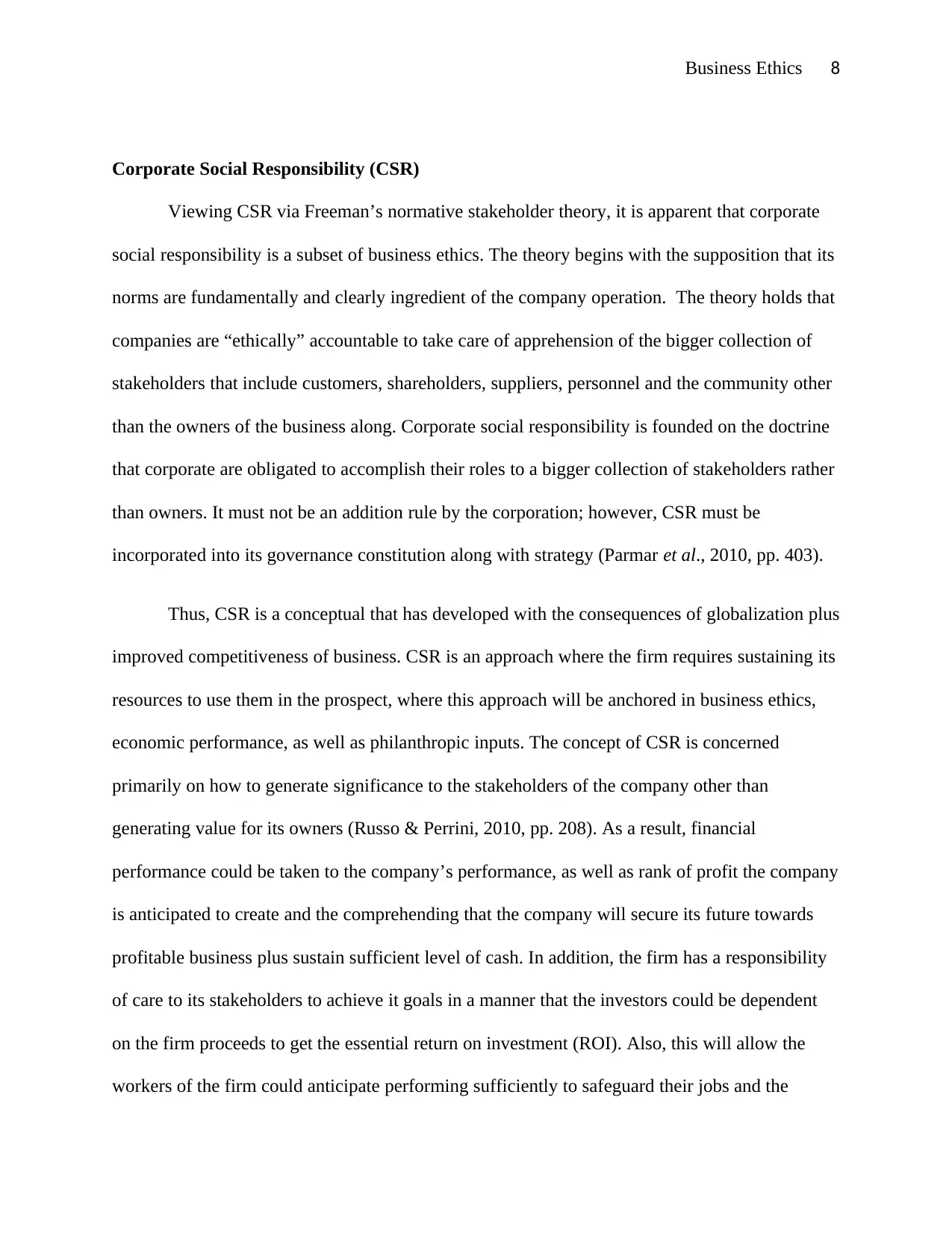
Business Ethics 8
Corporate Social Responsibility (CSR)
Viewing CSR via Freeman’s normative stakeholder theory, it is apparent that corporate
social responsibility is a subset of business ethics. The theory begins with the supposition that its
norms are fundamentally and clearly ingredient of the company operation. The theory holds that
companies are “ethically” accountable to take care of apprehension of the bigger collection of
stakeholders that include customers, shareholders, suppliers, personnel and the community other
than the owners of the business along. Corporate social responsibility is founded on the doctrine
that corporate are obligated to accomplish their roles to a bigger collection of stakeholders rather
than owners. It must not be an addition rule by the corporation; however, CSR must be
incorporated into its governance constitution along with strategy (Parmar et al., 2010, pp. 403).
Thus, CSR is a conceptual that has developed with the consequences of globalization plus
improved competitiveness of business. CSR is an approach where the firm requires sustaining its
resources to use them in the prospect, where this approach will be anchored in business ethics,
economic performance, as well as philanthropic inputs. The concept of CSR is concerned
primarily on how to generate significance to the stakeholders of the company other than
generating value for its owners (Russo & Perrini, 2010, pp. 208). As a result, financial
performance could be taken to the company’s performance, as well as rank of profit the company
is anticipated to create and the comprehending that the company will secure its future towards
profitable business plus sustain sufficient level of cash. In addition, the firm has a responsibility
of care to its stakeholders to achieve it goals in a manner that the investors could be dependent
on the firm proceeds to get the essential return on investment (ROI). Also, this will allow the
workers of the firm could anticipate performing sufficiently to safeguard their jobs and the
Corporate Social Responsibility (CSR)
Viewing CSR via Freeman’s normative stakeholder theory, it is apparent that corporate
social responsibility is a subset of business ethics. The theory begins with the supposition that its
norms are fundamentally and clearly ingredient of the company operation. The theory holds that
companies are “ethically” accountable to take care of apprehension of the bigger collection of
stakeholders that include customers, shareholders, suppliers, personnel and the community other
than the owners of the business along. Corporate social responsibility is founded on the doctrine
that corporate are obligated to accomplish their roles to a bigger collection of stakeholders rather
than owners. It must not be an addition rule by the corporation; however, CSR must be
incorporated into its governance constitution along with strategy (Parmar et al., 2010, pp. 403).
Thus, CSR is a conceptual that has developed with the consequences of globalization plus
improved competitiveness of business. CSR is an approach where the firm requires sustaining its
resources to use them in the prospect, where this approach will be anchored in business ethics,
economic performance, as well as philanthropic inputs. The concept of CSR is concerned
primarily on how to generate significance to the stakeholders of the company other than
generating value for its owners (Russo & Perrini, 2010, pp. 208). As a result, financial
performance could be taken to the company’s performance, as well as rank of profit the company
is anticipated to create and the comprehending that the company will secure its future towards
profitable business plus sustain sufficient level of cash. In addition, the firm has a responsibility
of care to its stakeholders to achieve it goals in a manner that the investors could be dependent
on the firm proceeds to get the essential return on investment (ROI). Also, this will allow the
workers of the firm could anticipate performing sufficiently to safeguard their jobs and the
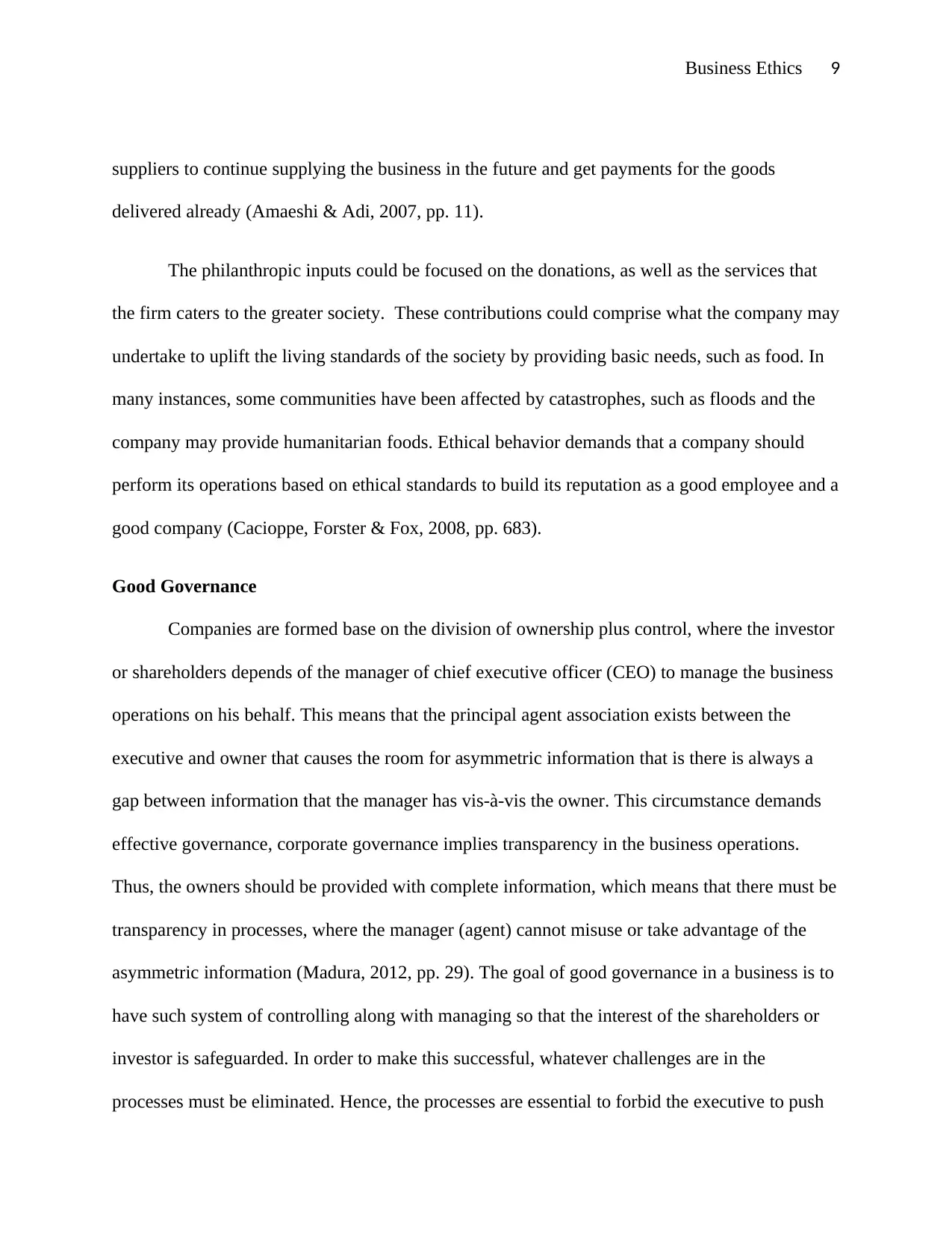
Business Ethics 9
suppliers to continue supplying the business in the future and get payments for the goods
delivered already (Amaeshi & Adi, 2007, pp. 11).
The philanthropic inputs could be focused on the donations, as well as the services that
the firm caters to the greater society. These contributions could comprise what the company may
undertake to uplift the living standards of the society by providing basic needs, such as food. In
many instances, some communities have been affected by catastrophes, such as floods and the
company may provide humanitarian foods. Ethical behavior demands that a company should
perform its operations based on ethical standards to build its reputation as a good employee and a
good company (Cacioppe, Forster & Fox, 2008, pp. 683).
Good Governance
Companies are formed base on the division of ownership plus control, where the investor
or shareholders depends of the manager of chief executive officer (CEO) to manage the business
operations on his behalf. This means that the principal agent association exists between the
executive and owner that causes the room for asymmetric information that is there is always a
gap between information that the manager has vis-à-vis the owner. This circumstance demands
effective governance, corporate governance implies transparency in the business operations.
Thus, the owners should be provided with complete information, which means that there must be
transparency in processes, where the manager (agent) cannot misuse or take advantage of the
asymmetric information (Madura, 2012, pp. 29). The goal of good governance in a business is to
have such system of controlling along with managing so that the interest of the shareholders or
investor is safeguarded. In order to make this successful, whatever challenges are in the
processes must be eliminated. Hence, the processes are essential to forbid the executive to push
suppliers to continue supplying the business in the future and get payments for the goods
delivered already (Amaeshi & Adi, 2007, pp. 11).
The philanthropic inputs could be focused on the donations, as well as the services that
the firm caters to the greater society. These contributions could comprise what the company may
undertake to uplift the living standards of the society by providing basic needs, such as food. In
many instances, some communities have been affected by catastrophes, such as floods and the
company may provide humanitarian foods. Ethical behavior demands that a company should
perform its operations based on ethical standards to build its reputation as a good employee and a
good company (Cacioppe, Forster & Fox, 2008, pp. 683).
Good Governance
Companies are formed base on the division of ownership plus control, where the investor
or shareholders depends of the manager of chief executive officer (CEO) to manage the business
operations on his behalf. This means that the principal agent association exists between the
executive and owner that causes the room for asymmetric information that is there is always a
gap between information that the manager has vis-à-vis the owner. This circumstance demands
effective governance, corporate governance implies transparency in the business operations.
Thus, the owners should be provided with complete information, which means that there must be
transparency in processes, where the manager (agent) cannot misuse or take advantage of the
asymmetric information (Madura, 2012, pp. 29). The goal of good governance in a business is to
have such system of controlling along with managing so that the interest of the shareholders or
investor is safeguarded. In order to make this successful, whatever challenges are in the
processes must be eliminated. Hence, the processes are essential to forbid the executive to push
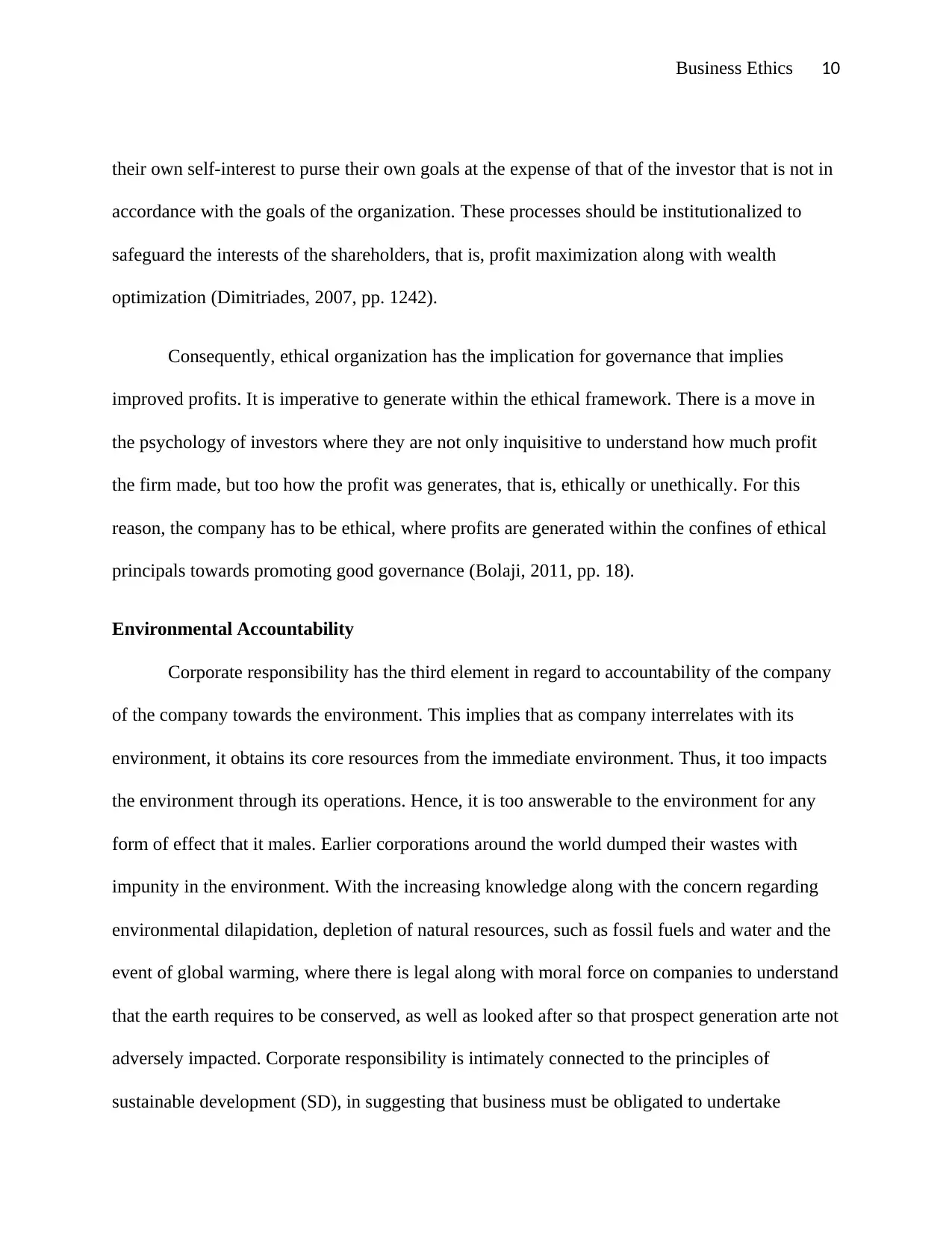
Business Ethics 10
their own self-interest to purse their own goals at the expense of that of the investor that is not in
accordance with the goals of the organization. These processes should be institutionalized to
safeguard the interests of the shareholders, that is, profit maximization along with wealth
optimization (Dimitriades, 2007, pp. 1242).
Consequently, ethical organization has the implication for governance that implies
improved profits. It is imperative to generate within the ethical framework. There is a move in
the psychology of investors where they are not only inquisitive to understand how much profit
the firm made, but too how the profit was generates, that is, ethically or unethically. For this
reason, the company has to be ethical, where profits are generated within the confines of ethical
principals towards promoting good governance (Bolaji, 2011, pp. 18).
Environmental Accountability
Corporate responsibility has the third element in regard to accountability of the company
of the company towards the environment. This implies that as company interrelates with its
environment, it obtains its core resources from the immediate environment. Thus, it too impacts
the environment through its operations. Hence, it is too answerable to the environment for any
form of effect that it males. Earlier corporations around the world dumped their wastes with
impunity in the environment. With the increasing knowledge along with the concern regarding
environmental dilapidation, depletion of natural resources, such as fossil fuels and water and the
event of global warming, where there is legal along with moral force on companies to understand
that the earth requires to be conserved, as well as looked after so that prospect generation arte not
adversely impacted. Corporate responsibility is intimately connected to the principles of
sustainable development (SD), in suggesting that business must be obligated to undertake
their own self-interest to purse their own goals at the expense of that of the investor that is not in
accordance with the goals of the organization. These processes should be institutionalized to
safeguard the interests of the shareholders, that is, profit maximization along with wealth
optimization (Dimitriades, 2007, pp. 1242).
Consequently, ethical organization has the implication for governance that implies
improved profits. It is imperative to generate within the ethical framework. There is a move in
the psychology of investors where they are not only inquisitive to understand how much profit
the firm made, but too how the profit was generates, that is, ethically or unethically. For this
reason, the company has to be ethical, where profits are generated within the confines of ethical
principals towards promoting good governance (Bolaji, 2011, pp. 18).
Environmental Accountability
Corporate responsibility has the third element in regard to accountability of the company
of the company towards the environment. This implies that as company interrelates with its
environment, it obtains its core resources from the immediate environment. Thus, it too impacts
the environment through its operations. Hence, it is too answerable to the environment for any
form of effect that it males. Earlier corporations around the world dumped their wastes with
impunity in the environment. With the increasing knowledge along with the concern regarding
environmental dilapidation, depletion of natural resources, such as fossil fuels and water and the
event of global warming, where there is legal along with moral force on companies to understand
that the earth requires to be conserved, as well as looked after so that prospect generation arte not
adversely impacted. Corporate responsibility is intimately connected to the principles of
sustainable development (SD), in suggesting that business must be obligated to undertake
Secure Best Marks with AI Grader
Need help grading? Try our AI Grader for instant feedback on your assignments.
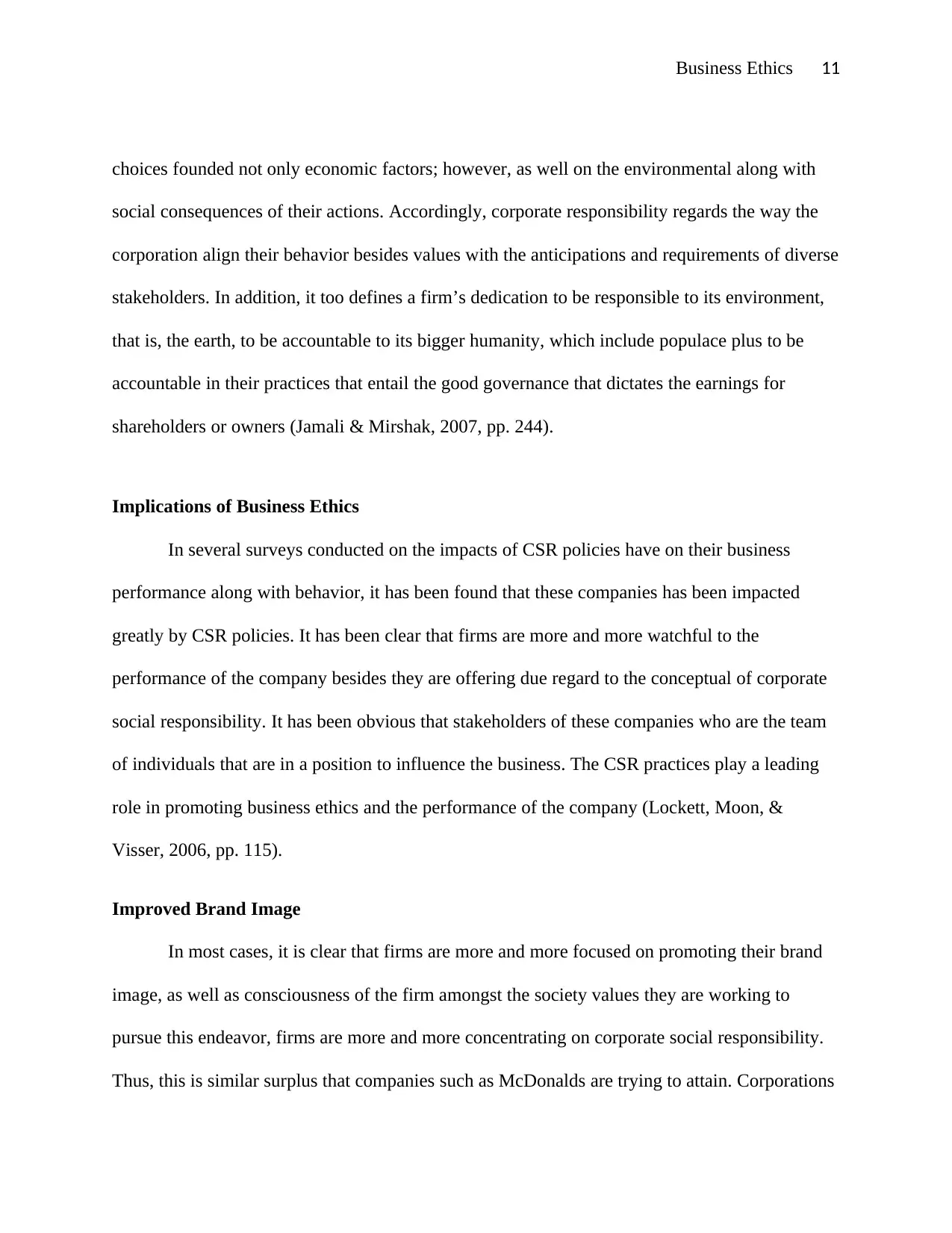
Business Ethics 11
choices founded not only economic factors; however, as well on the environmental along with
social consequences of their actions. Accordingly, corporate responsibility regards the way the
corporation align their behavior besides values with the anticipations and requirements of diverse
stakeholders. In addition, it too defines a firm’s dedication to be responsible to its environment,
that is, the earth, to be accountable to its bigger humanity, which include populace plus to be
accountable in their practices that entail the good governance that dictates the earnings for
shareholders or owners (Jamali & Mirshak, 2007, pp. 244).
Implications of Business Ethics
In several surveys conducted on the impacts of CSR policies have on their business
performance along with behavior, it has been found that these companies has been impacted
greatly by CSR policies. It has been clear that firms are more and more watchful to the
performance of the company besides they are offering due regard to the conceptual of corporate
social responsibility. It has been obvious that stakeholders of these companies who are the team
of individuals that are in a position to influence the business. The CSR practices play a leading
role in promoting business ethics and the performance of the company (Lockett, Moon, &
Visser, 2006, pp. 115).
Improved Brand Image
In most cases, it is clear that firms are more and more focused on promoting their brand
image, as well as consciousness of the firm amongst the society values they are working to
pursue this endeavor, firms are more and more concentrating on corporate social responsibility.
Thus, this is similar surplus that companies such as McDonalds are trying to attain. Corporations
choices founded not only economic factors; however, as well on the environmental along with
social consequences of their actions. Accordingly, corporate responsibility regards the way the
corporation align their behavior besides values with the anticipations and requirements of diverse
stakeholders. In addition, it too defines a firm’s dedication to be responsible to its environment,
that is, the earth, to be accountable to its bigger humanity, which include populace plus to be
accountable in their practices that entail the good governance that dictates the earnings for
shareholders or owners (Jamali & Mirshak, 2007, pp. 244).
Implications of Business Ethics
In several surveys conducted on the impacts of CSR policies have on their business
performance along with behavior, it has been found that these companies has been impacted
greatly by CSR policies. It has been clear that firms are more and more watchful to the
performance of the company besides they are offering due regard to the conceptual of corporate
social responsibility. It has been obvious that stakeholders of these companies who are the team
of individuals that are in a position to influence the business. The CSR practices play a leading
role in promoting business ethics and the performance of the company (Lockett, Moon, &
Visser, 2006, pp. 115).
Improved Brand Image
In most cases, it is clear that firms are more and more focused on promoting their brand
image, as well as consciousness of the firm amongst the society values they are working to
pursue this endeavor, firms are more and more concentrating on corporate social responsibility.
Thus, this is similar surplus that companies such as McDonalds are trying to attain. Corporations
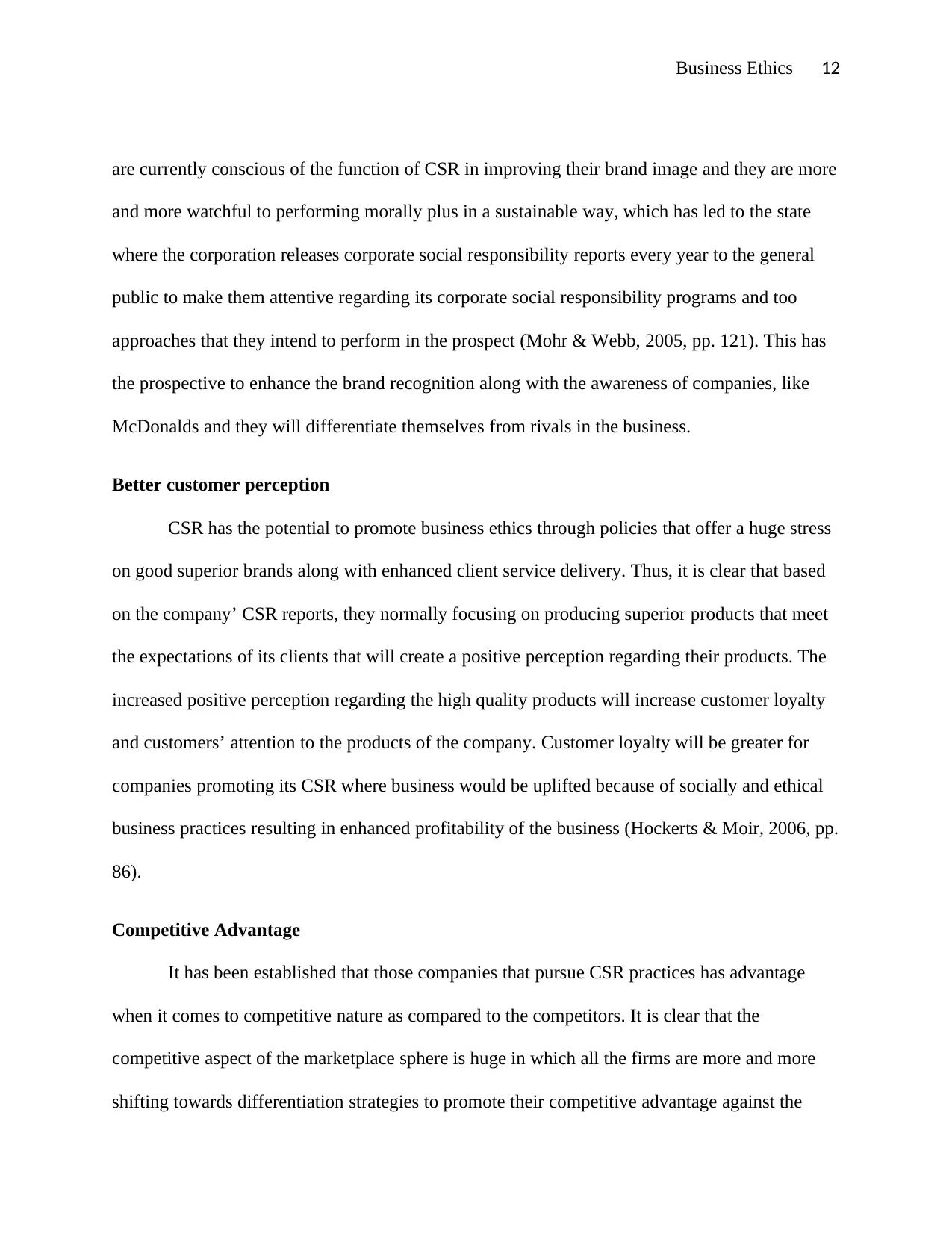
Business Ethics 12
are currently conscious of the function of CSR in improving their brand image and they are more
and more watchful to performing morally plus in a sustainable way, which has led to the state
where the corporation releases corporate social responsibility reports every year to the general
public to make them attentive regarding its corporate social responsibility programs and too
approaches that they intend to perform in the prospect (Mohr & Webb, 2005, pp. 121). This has
the prospective to enhance the brand recognition along with the awareness of companies, like
McDonalds and they will differentiate themselves from rivals in the business.
Better customer perception
CSR has the potential to promote business ethics through policies that offer a huge stress
on good superior brands along with enhanced client service delivery. Thus, it is clear that based
on the company’ CSR reports, they normally focusing on producing superior products that meet
the expectations of its clients that will create a positive perception regarding their products. The
increased positive perception regarding the high quality products will increase customer loyalty
and customers’ attention to the products of the company. Customer loyalty will be greater for
companies promoting its CSR where business would be uplifted because of socially and ethical
business practices resulting in enhanced profitability of the business (Hockerts & Moir, 2006, pp.
86).
Competitive Advantage
It has been established that those companies that pursue CSR practices has advantage
when it comes to competitive nature as compared to the competitors. It is clear that the
competitive aspect of the marketplace sphere is huge in which all the firms are more and more
shifting towards differentiation strategies to promote their competitive advantage against the
are currently conscious of the function of CSR in improving their brand image and they are more
and more watchful to performing morally plus in a sustainable way, which has led to the state
where the corporation releases corporate social responsibility reports every year to the general
public to make them attentive regarding its corporate social responsibility programs and too
approaches that they intend to perform in the prospect (Mohr & Webb, 2005, pp. 121). This has
the prospective to enhance the brand recognition along with the awareness of companies, like
McDonalds and they will differentiate themselves from rivals in the business.
Better customer perception
CSR has the potential to promote business ethics through policies that offer a huge stress
on good superior brands along with enhanced client service delivery. Thus, it is clear that based
on the company’ CSR reports, they normally focusing on producing superior products that meet
the expectations of its clients that will create a positive perception regarding their products. The
increased positive perception regarding the high quality products will increase customer loyalty
and customers’ attention to the products of the company. Customer loyalty will be greater for
companies promoting its CSR where business would be uplifted because of socially and ethical
business practices resulting in enhanced profitability of the business (Hockerts & Moir, 2006, pp.
86).
Competitive Advantage
It has been established that those companies that pursue CSR practices has advantage
when it comes to competitive nature as compared to the competitors. It is clear that the
competitive aspect of the marketplace sphere is huge in which all the firms are more and more
shifting towards differentiation strategies to promote their competitive advantage against the
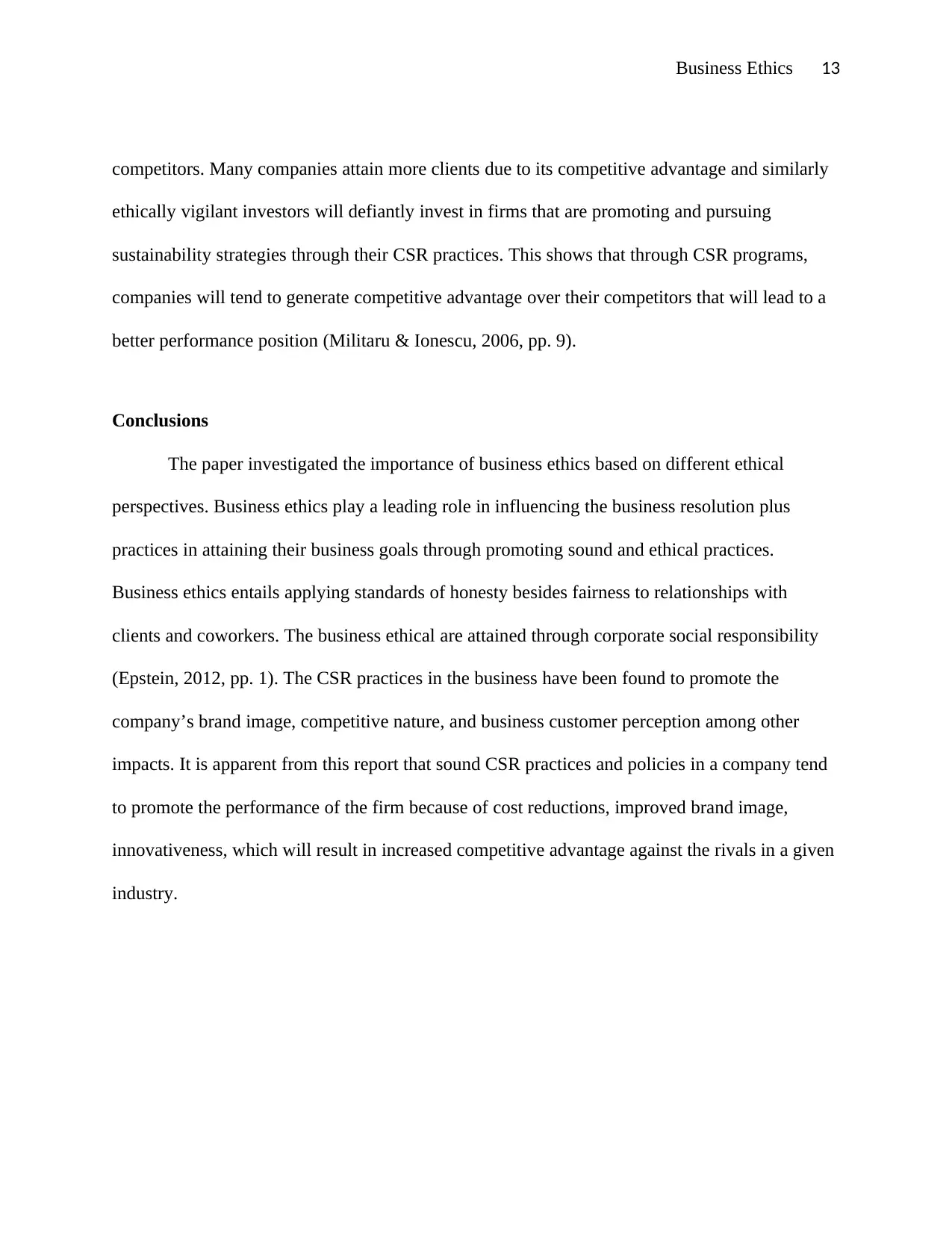
Business Ethics 13
competitors. Many companies attain more clients due to its competitive advantage and similarly
ethically vigilant investors will defiantly invest in firms that are promoting and pursuing
sustainability strategies through their CSR practices. This shows that through CSR programs,
companies will tend to generate competitive advantage over their competitors that will lead to a
better performance position (Militaru & Ionescu, 2006, pp. 9).
Conclusions
The paper investigated the importance of business ethics based on different ethical
perspectives. Business ethics play a leading role in influencing the business resolution plus
practices in attaining their business goals through promoting sound and ethical practices.
Business ethics entails applying standards of honesty besides fairness to relationships with
clients and coworkers. The business ethical are attained through corporate social responsibility
(Epstein, 2012, pp. 1). The CSR practices in the business have been found to promote the
company’s brand image, competitive nature, and business customer perception among other
impacts. It is apparent from this report that sound CSR practices and policies in a company tend
to promote the performance of the firm because of cost reductions, improved brand image,
innovativeness, which will result in increased competitive advantage against the rivals in a given
industry.
competitors. Many companies attain more clients due to its competitive advantage and similarly
ethically vigilant investors will defiantly invest in firms that are promoting and pursuing
sustainability strategies through their CSR practices. This shows that through CSR programs,
companies will tend to generate competitive advantage over their competitors that will lead to a
better performance position (Militaru & Ionescu, 2006, pp. 9).
Conclusions
The paper investigated the importance of business ethics based on different ethical
perspectives. Business ethics play a leading role in influencing the business resolution plus
practices in attaining their business goals through promoting sound and ethical practices.
Business ethics entails applying standards of honesty besides fairness to relationships with
clients and coworkers. The business ethical are attained through corporate social responsibility
(Epstein, 2012, pp. 1). The CSR practices in the business have been found to promote the
company’s brand image, competitive nature, and business customer perception among other
impacts. It is apparent from this report that sound CSR practices and policies in a company tend
to promote the performance of the firm because of cost reductions, improved brand image,
innovativeness, which will result in increased competitive advantage against the rivals in a given
industry.
Paraphrase This Document
Need a fresh take? Get an instant paraphrase of this document with our AI Paraphraser
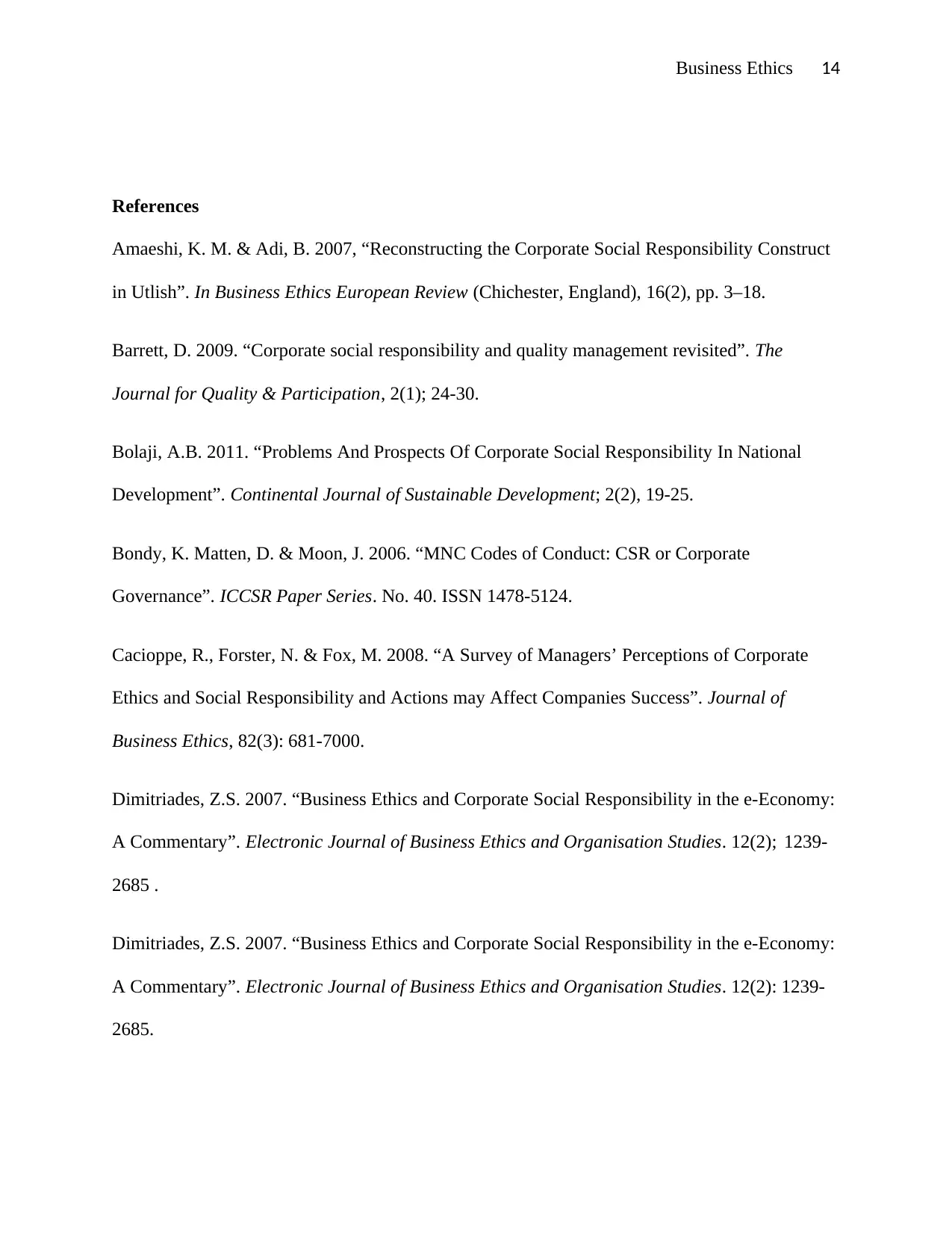
Business Ethics 14
References
Amaeshi, K. M. & Adi, B. 2007, “Reconstructing the Corporate Social Responsibility Construct
in Utlish”. In Business Ethics European Review (Chichester, England), 16(2), pp. 3–18.
Barrett, D. 2009. “Corporate social responsibility and quality management revisited”. The
Journal for Quality & Participation, 2(1); 24-30.
Bolaji, A.B. 2011. “Problems And Prospects Of Corporate Social Responsibility In National
Development”. Continental Journal of Sustainable Development; 2(2), 19-25.
Bondy, K. Matten, D. & Moon, J. 2006. “MNC Codes of Conduct: CSR or Corporate
Governance”. ICCSR Paper Series. No. 40. ISSN 1478-5124.
Cacioppe, R., Forster, N. & Fox, M. 2008. “A Survey of Managers’ Perceptions of Corporate
Ethics and Social Responsibility and Actions may Affect Companies Success”. Journal of
Business Ethics, 82(3): 681-7000.
Dimitriades, Z.S. 2007. “Business Ethics and Corporate Social Responsibility in the e-Economy:
A Commentary”. Electronic Journal of Business Ethics and Organisation Studies. 12(2); 1239-
2685 .
Dimitriades, Z.S. 2007. “Business Ethics and Corporate Social Responsibility in the e-Economy:
A Commentary”. Electronic Journal of Business Ethics and Organisation Studies. 12(2): 1239-
2685.
References
Amaeshi, K. M. & Adi, B. 2007, “Reconstructing the Corporate Social Responsibility Construct
in Utlish”. In Business Ethics European Review (Chichester, England), 16(2), pp. 3–18.
Barrett, D. 2009. “Corporate social responsibility and quality management revisited”. The
Journal for Quality & Participation, 2(1); 24-30.
Bolaji, A.B. 2011. “Problems And Prospects Of Corporate Social Responsibility In National
Development”. Continental Journal of Sustainable Development; 2(2), 19-25.
Bondy, K. Matten, D. & Moon, J. 2006. “MNC Codes of Conduct: CSR or Corporate
Governance”. ICCSR Paper Series. No. 40. ISSN 1478-5124.
Cacioppe, R., Forster, N. & Fox, M. 2008. “A Survey of Managers’ Perceptions of Corporate
Ethics and Social Responsibility and Actions may Affect Companies Success”. Journal of
Business Ethics, 82(3): 681-7000.
Dimitriades, Z.S. 2007. “Business Ethics and Corporate Social Responsibility in the e-Economy:
A Commentary”. Electronic Journal of Business Ethics and Organisation Studies. 12(2); 1239-
2685 .
Dimitriades, Z.S. 2007. “Business Ethics and Corporate Social Responsibility in the e-Economy:
A Commentary”. Electronic Journal of Business Ethics and Organisation Studies. 12(2): 1239-
2685.
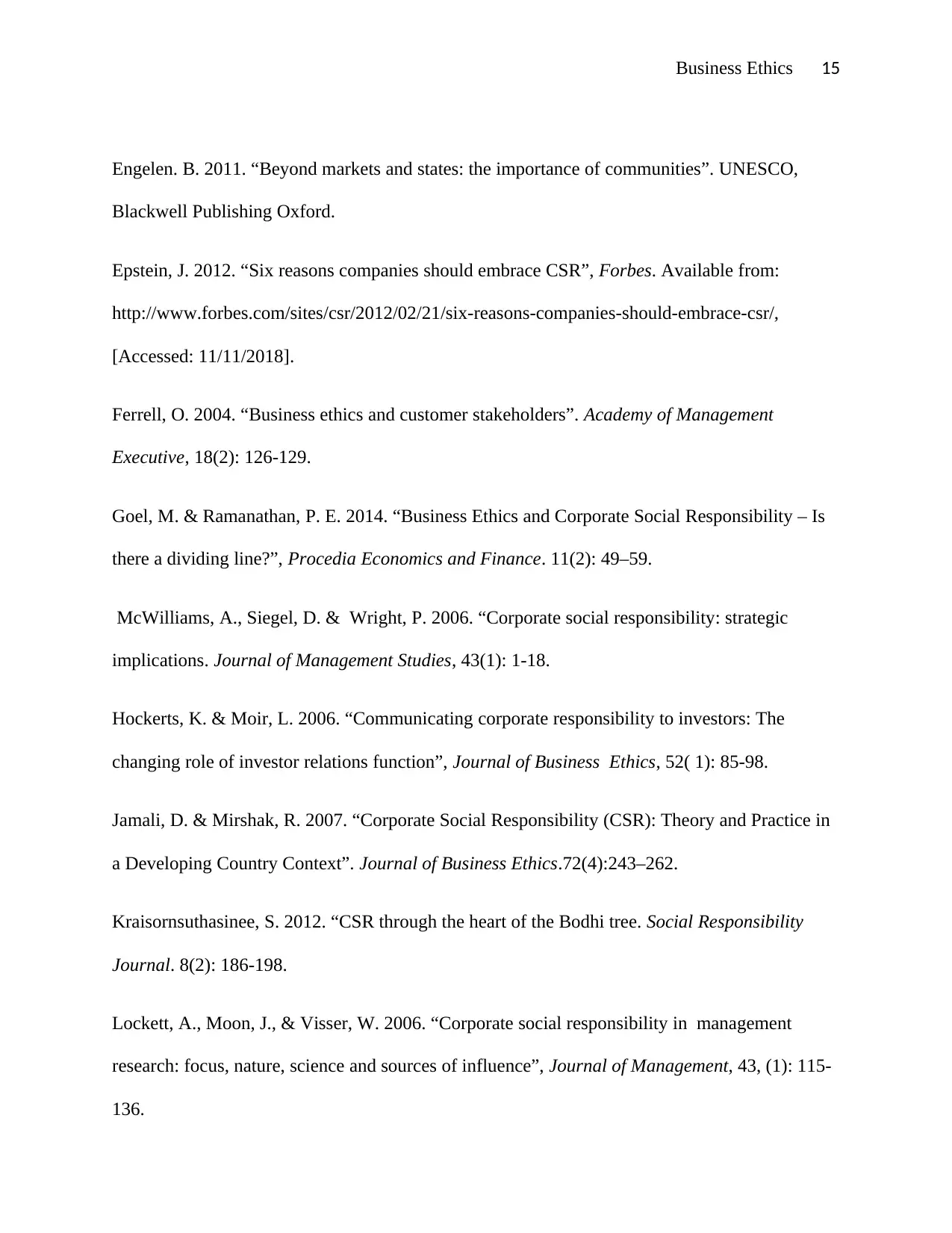
Business Ethics 15
Engelen. B. 2011. “Beyond markets and states: the importance of communities”. UNESCO,
Blackwell Publishing Oxford.
Epstein, J. 2012. “Six reasons companies should embrace CSR”, Forbes. Available from:
http://www.forbes.com/sites/csr/2012/02/21/six-reasons-companies-should-embrace-csr/,
[Accessed: 11/11/2018].
Ferrell, O. 2004. “Business ethics and customer stakeholders”. Academy of Management
Executive, 18(2): 126-129.
Goel, M. & Ramanathan, P. E. 2014. “Business Ethics and Corporate Social Responsibility – Is
there a dividing line?”, Procedia Economics and Finance. 11(2): 49–59.
McWilliams, A., Siegel, D. & Wright, P. 2006. “Corporate social responsibility: strategic
implications. Journal of Management Studies, 43(1): 1-18.
Hockerts, K. & Moir, L. 2006. “Communicating corporate responsibility to investors: The
changing role of investor relations function”, Journal of Business Ethics, 52( 1): 85-98.
Jamali, D. & Mirshak, R. 2007. “Corporate Social Responsibility (CSR): Theory and Practice in
a Developing Country Context”. Journal of Business Ethics.72(4):243–262.
Kraisornsuthasinee, S. 2012. “CSR through the heart of the Bodhi tree. Social Responsibility
Journal. 8(2): 186-198.
Lockett, A., Moon, J., & Visser, W. 2006. “Corporate social responsibility in management
research: focus, nature, science and sources of influence”, Journal of Management, 43, (1): 115-
136.
Engelen. B. 2011. “Beyond markets and states: the importance of communities”. UNESCO,
Blackwell Publishing Oxford.
Epstein, J. 2012. “Six reasons companies should embrace CSR”, Forbes. Available from:
http://www.forbes.com/sites/csr/2012/02/21/six-reasons-companies-should-embrace-csr/,
[Accessed: 11/11/2018].
Ferrell, O. 2004. “Business ethics and customer stakeholders”. Academy of Management
Executive, 18(2): 126-129.
Goel, M. & Ramanathan, P. E. 2014. “Business Ethics and Corporate Social Responsibility – Is
there a dividing line?”, Procedia Economics and Finance. 11(2): 49–59.
McWilliams, A., Siegel, D. & Wright, P. 2006. “Corporate social responsibility: strategic
implications. Journal of Management Studies, 43(1): 1-18.
Hockerts, K. & Moir, L. 2006. “Communicating corporate responsibility to investors: The
changing role of investor relations function”, Journal of Business Ethics, 52( 1): 85-98.
Jamali, D. & Mirshak, R. 2007. “Corporate Social Responsibility (CSR): Theory and Practice in
a Developing Country Context”. Journal of Business Ethics.72(4):243–262.
Kraisornsuthasinee, S. 2012. “CSR through the heart of the Bodhi tree. Social Responsibility
Journal. 8(2): 186-198.
Lockett, A., Moon, J., & Visser, W. 2006. “Corporate social responsibility in management
research: focus, nature, science and sources of influence”, Journal of Management, 43, (1): 115-
136.
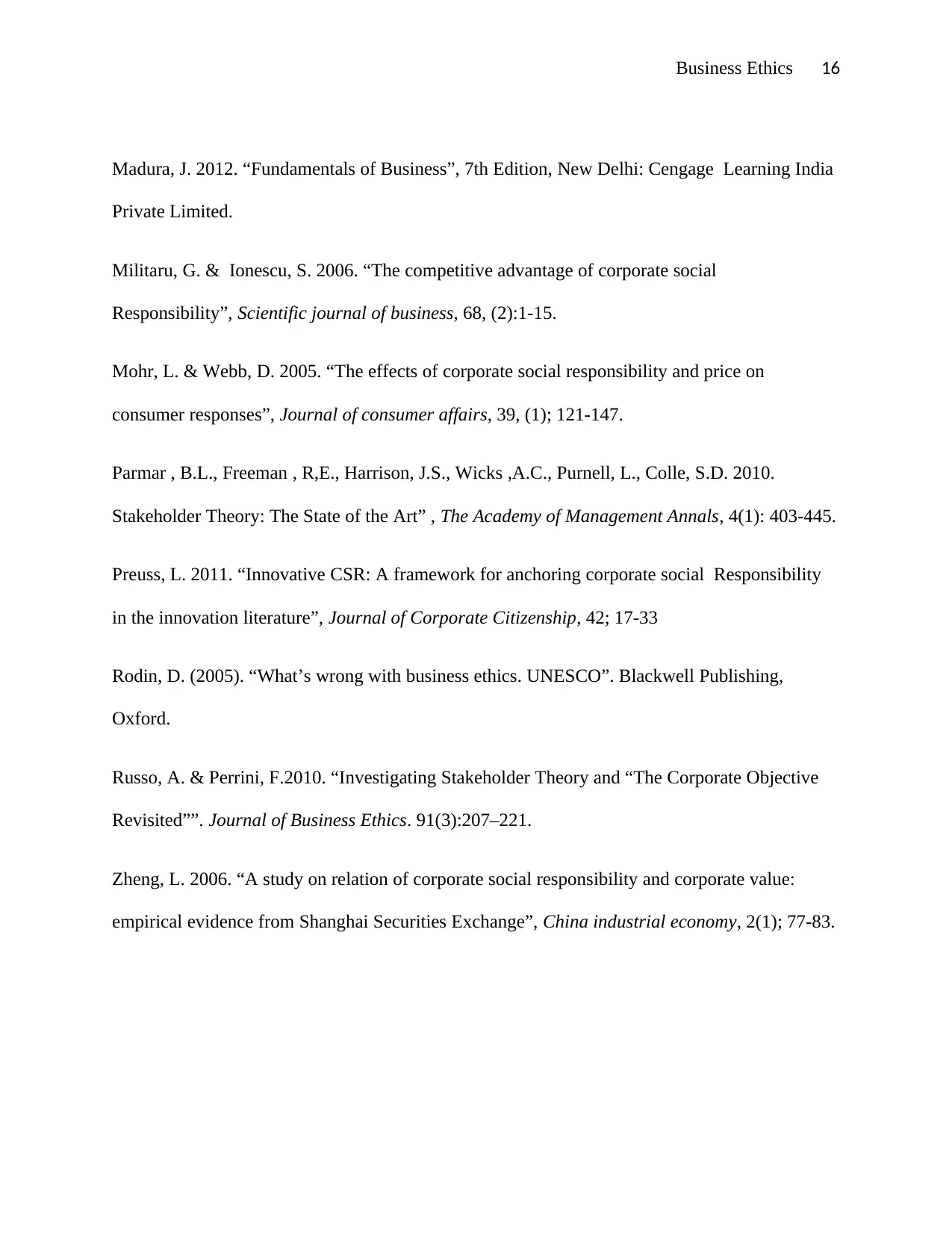
Business Ethics 16
Madura, J. 2012. “Fundamentals of Business”, 7th Edition, New Delhi: Cengage Learning India
Private Limited.
Militaru, G. & Ionescu, S. 2006. “The competitive advantage of corporate social
Responsibility”, Scientific journal of business, 68, (2):1-15.
Mohr, L. & Webb, D. 2005. “The effects of corporate social responsibility and price on
consumer responses”, Journal of consumer affairs, 39, (1); 121-147.
Parmar , B.L., Freeman , R,E., Harrison, J.S., Wicks ,A.C., Purnell, L., Colle, S.D. 2010.
Stakeholder Theory: The State of the Art” , The Academy of Management Annals, 4(1): 403-445.
Preuss, L. 2011. “Innovative CSR: A framework for anchoring corporate social Responsibility
in the innovation literature”, Journal of Corporate Citizenship, 42; 17-33
Rodin, D. (2005). “What’s wrong with business ethics. UNESCO”. Blackwell Publishing,
Oxford.
Russo, A. & Perrini, F.2010. “Investigating Stakeholder Theory and “The Corporate Objective
Revisited””. Journal of Business Ethics. 91(3):207–221.
Zheng, L. 2006. “A study on relation of corporate social responsibility and corporate value:
empirical evidence from Shanghai Securities Exchange”, China industrial economy, 2(1); 77-83.
Madura, J. 2012. “Fundamentals of Business”, 7th Edition, New Delhi: Cengage Learning India
Private Limited.
Militaru, G. & Ionescu, S. 2006. “The competitive advantage of corporate social
Responsibility”, Scientific journal of business, 68, (2):1-15.
Mohr, L. & Webb, D. 2005. “The effects of corporate social responsibility and price on
consumer responses”, Journal of consumer affairs, 39, (1); 121-147.
Parmar , B.L., Freeman , R,E., Harrison, J.S., Wicks ,A.C., Purnell, L., Colle, S.D. 2010.
Stakeholder Theory: The State of the Art” , The Academy of Management Annals, 4(1): 403-445.
Preuss, L. 2011. “Innovative CSR: A framework for anchoring corporate social Responsibility
in the innovation literature”, Journal of Corporate Citizenship, 42; 17-33
Rodin, D. (2005). “What’s wrong with business ethics. UNESCO”. Blackwell Publishing,
Oxford.
Russo, A. & Perrini, F.2010. “Investigating Stakeholder Theory and “The Corporate Objective
Revisited””. Journal of Business Ethics. 91(3):207–221.
Zheng, L. 2006. “A study on relation of corporate social responsibility and corporate value:
empirical evidence from Shanghai Securities Exchange”, China industrial economy, 2(1); 77-83.
1 out of 16
Related Documents
Your All-in-One AI-Powered Toolkit for Academic Success.
+13062052269
info@desklib.com
Available 24*7 on WhatsApp / Email
![[object Object]](/_next/static/media/star-bottom.7253800d.svg)
Unlock your academic potential
© 2024 | Zucol Services PVT LTD | All rights reserved.




